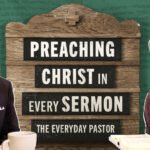Charles Spurgeon called it the sweetest psalm. He even gave it a nickname: “the Pearl of the Psalms.” And it is indeed sublime.
But Psalm 84 is not a song of triumph; it is a cry of desperation. The psalmist yearns to be in Jerusalem, worshiping at the temple in the presence of God’s people: “My soul longs, yes, faints for the courts of the LORD” (v. 2).
He wants to be there so badly that he’s even jealous of the birds who nest in the temple rafters (v. 3). It’s unclear why he can’t embark on the pilgrimage, but this much is plain: the psalmist is not where he wants to be. Life’s circumstances have conspired to thwart his heart’s desire.
It’s startling, therefore, to hear him repeatedly speak of being blessed.
I’ve appreciated Psalm 84 over the years, but the challenges of pandemic life have led me to rediscover its beauty and wisdom. Here are three timely lessons from this ancient song.
1. Blessed Beats #Blessed
When I searched the hashtag #blessed on Instagram today, I got more than 133 million results. Generally these are selfies, photos from fun places, or, more specifically, selfies from fun places. Most of the posts share a common theme, even if it’s not said outright. The underlying message is often: Hey, everyone! Look at my great life! And accompanying the photos, there it is: #blessed.
What are we to infer about what it means to be blessed?
To be sure, God showers tangible blessings on us in all kinds of ways. What happens, though, when the latest thing he’s handed you is not a picture-perfect vacation but, say, a global pandemic? A pay cut? A fractured relationship?
What’s the hashtag for that—#cursed?
Thankfully not. In this brief chapter, the psalmist refers to blessing three times:
- “Blessed are those who dwell in your house, ever singing your praise!” (v. 4).
- “Blessed are those whose strength is in you, in whose heart are the highways to Zion” (v. 5).
- “Blessed is the one who trusts in you!” (v. 12).
Those who praise God, who find their strength and trust in him: those are the blessed. The psalmist is resolved to remind us that the good life is not about having everything you wanted; it’s about having God—even if it’s in the midst of nothing you wanted.
The good life is not about having everything you wanted; it’s about having God—even if it’s in the midst of nothing you wanted.
And in Scripture, this primarily spiritual meaning of “blessed” only intensifies after the coming of Jesus. Of the New Testament’s 112 references to being blessed, do you know how many focus on material things?
Zero.
That’s astonishing. And it demonstrates that being truly blessed runs so much deeper than the concept we see plastered beside pretty photos on social media.
2. Don’t Settle for Following Your Heart
In verse 5, the psalmist prays: “Blessed are those whose strength is in you, in whose heart are the highways to Zion.” Isn’t that a fascinating phrase?
Just like the biblical definition of being blessed, this language is strikingly countercultural today. The world is constantly telling you to look within yourself, to study the compass of your heart, to follow wherever your passion leads. “You do you,” we hear.
Psalm 84 has no patience for such nonsense. True joy, it insists, is not having an internal compass that says, “Follow me,” but one that says, “Follow God.” In which direction do the highways of your heart run?
Happy is the heart that isn’t a cul-de-sac of self-regard—I must discover myself, express myself, be true to myself—but rather that contains highways leading out of that congested city, in pursuit of God and in service to others.
When we pursue his agenda over ours, we are blessed.
3. God Supplies Strength to Anxious Hearts
Have you ever feared you wouldn’t have the strength to face a particular challenge? I sure have. And, according to the Bible, we can’t face the future . . . yet.
In 1956, C. S. Lewis corresponded with a woman who struggled with worry—worry that she wouldn’t have the ability to endure if this or that occurred. At one point, Lewis simply wrote: “Remember, one is given strength to bear what happens, not the 100 and 1 different things that might happen.”
And when will the strength you need arrive? Just in time.
A little over a decade before Lewis’s letter, a Dutch Christian named Corrie ten Boom was barely holding on in a Nazi concentration camp. In her classic autobiography years later, she reflected on the timing of God’s provision. As an illustration, she recounted her own anxiety as a 6-year-old girl:
Father sat down on the edge of the narrow bed. “Corrie,” he began gently, “when you and I go to Amsterdam, when do I give you your ticket?”
I sniffed a few times, considering this.
“Why, just before we get on the train.”
“Exactly. And our wise Father in heaven knows when we’re going to need things, too. Don’t run out ahead of him, Corrie.”
God will not be rushed, and spiritual growth cannot be microwaved. The Christian life is a long and arduous pilgrimage, one trusting step at a time.
True Temple
Of course, for the Christian, the temple looks different than it did for the psalmist. A thousand years after Psalm 84 was written, a man arrived in Jerusalem and began saying radical things like, “Destroy this temple, and in three days I will raise it up” (John 2:19).
The Jewish leaders scoffed: “It has taken 46 years to build this temple, and will you raise it up in three days?” (v. 20). But he was referring to his body (v. 21)—soon to be destroyed by crucifixion, then raised to resurrection life.
True joy is not having an internal compass that says, ‘Follow me,’ but one that says, ‘Follow him.’
What the psalmist so longed for was just a precursor to the true meeting place between God and men—Jesus Christ. And the pages of the New Testament rustle with the news: every person who trusts in him becomes a living stone in a new spiritual temple (1 Cor. 3:16; Eph. 2:22; 1 Pet. 2:4–5). The temple of God is no longer a towering structure in Israel. His temple is the person of Jesus and, by extension, his gathered church—the arena where his glory specially resides.
Do you desire to be #blessed or blessed? Do you want a heart that’s really free? Do you long to gather strength as you endure life’s long and perilous road?
If so, then Psalm 84 is for you. Anchor your hope in God. He will never fail you.
A version of this article appeared at Explore God.
Involved in Women’s Ministry? Add This to Your Discipleship Tool Kit.
 We need one another. Yet we don’t always know how to develop deep relationships to help us grow in the Christian life. Younger believers benefit from the guidance and wisdom of more mature saints as their faith deepens. But too often, potential mentors lack clarity and training on how to engage in discipling those they can influence.
We need one another. Yet we don’t always know how to develop deep relationships to help us grow in the Christian life. Younger believers benefit from the guidance and wisdom of more mature saints as their faith deepens. But too often, potential mentors lack clarity and training on how to engage in discipling those they can influence.
Whether you’re longing to find a spiritual mentor or hoping to serve as a guide for someone else, we have a FREE resource to encourage and equip you. In Growing Together: Taking Mentoring Beyond Small Talk and Prayer Requests, Melissa Kruger, TGC’s vice president of discipleship programming, offers encouraging lessons to guide conversations that promote spiritual growth in both the mentee and mentor.

































